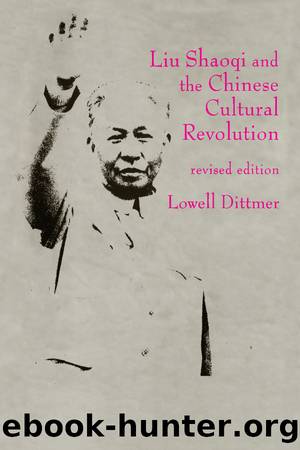Liu Shaoqi and the Chinese Cultural Revolution by Lowell Dittmer

Author:Lowell Dittmer [Dittmer, Lowell]
Language: eng
Format: epub
Tags: Ethnic Studies, Public Policy, Social Science, Political Science, Regional Studies, General
ISBN: 9781317466017
Google: _m2mBgAAQBAJ
Publisher: Routledge
Published: 2015-02-12T10:43:50+00:00
Economic Themes
Critique
The essential criticism of Liuâs economic policies was, of course, that he promoted economic ârevisionismâ and sought thereby to lead China down the âcapitalist road.â These policies had both defensive and offensive dimensions: the former encompassed Liuâs âshieldingâ of ex-capitalist elements and otherwise obstructing the socialization process, the latter his introduction of various ârevisionistâ elements into the socialist economic system. The GLF seems to be the watershed that divides the defensive and offensive strategies chronologically. First, then, we turn to an examination of Liuâs alleged protection of capitalism (which was polemically defined simply as the amassing of an invidious proportion of wealth, without much regard for the mode of production by which wealth is acquired), and then proceed to an examination of his active promotion of ârevisionism.â
Opposition to SocializationâIndications of Liuâs tendencies to âshieldâ bourgeoisie are found in writings dating from as early as 1924 (in the article, âSave the Hanyeping Iron and Steel Companyâ), but certainly the most frequently cited indications of shielding are culled from his 1949â50 speeches to laborers and capitalists in Tianjin, immediately following Communist capture of the city. âExploitation has its merits,â he said, defending managerial discretion to hire and fire and set pay and working hours. When asked how workers should act, he replied, âbasically as in the past.â He admitted that âtaxes were heavyâ and encouraged capitalists to âconsult together and share responsibilityâ to devise new tax scales, or even to reopen the Tianjin Stock Exchange, adding, âIf you have any good and feasible plans, you may let me know. I have a 50 percent say in these things.â But in regard to the attempts of workers to set up and run their own factories without expert assistance, Liu expressed skepticism:
Some workers would say, âWe can run factories even without capitalists. Let us get organized to run cooperative factories.â What about the cooperative factories? Many have been set up, but not a single one is run with success.78
In his analysis of post-Liberation class structure, the critics point out, Mao said the fundamental contradiction would be between the proletariat and the bourgeoisie and that it would emerge in the form of struggle between ârestriction and opposition to restrictionâ of capitalism. Within the purview of ârestriction,â the âbiggest agent of the bourgeoisieâ perceived âvast room for private enterprise to develop alongside the state-owned enterprises.â In fact, he proposed restrictions of the proletariat and protection of private industry under the slogans âjoint public-private operationâ and âmutual development.â âMutual developmentâ meant not only that half-private enterprisers might be incorporated into the socialist managerial elite, in a mutually profitable relationship with representatives of the proletariat. Even after basic completion of socialist transformation of ownership of the means of production in 1957, Liu reaffirmed his paternalistic solicitude for the welfare of progressive capitalists: âAs long as the industrialists and businessmen follow the lead of the Peopleâs Government and promote socialism with heart and soul⦠we will hold ourselves responsible for them to the end regardless of whether they are young or old, in sickness or in health.
Download
This site does not store any files on its server. We only index and link to content provided by other sites. Please contact the content providers to delete copyright contents if any and email us, we'll remove relevant links or contents immediately.
| China | India & South Asia |
| Japan |
Fanny Burney by Claire Harman(26597)
Empire of the Sikhs by Patwant Singh(23072)
Out of India by Michael Foss(16848)
Leonardo da Vinci by Walter Isaacson(13316)
Small Great Things by Jodi Picoult(7121)
The Six Wives Of Henry VIII (WOMEN IN HISTORY) by Fraser Antonia(5496)
The Wind in My Hair by Masih Alinejad(5091)
A Higher Loyalty: Truth, Lies, and Leadership by James Comey(4954)
The Crown by Robert Lacey(4806)
The Lonely City by Olivia Laing(4798)
Millionaire: The Philanderer, Gambler, and Duelist Who Invented Modern Finance by Janet Gleeson(4465)
The Iron Duke by The Iron Duke(4349)
Papillon (English) by Henri Charrière(4262)
Sticky Fingers by Joe Hagan(4188)
Joan of Arc by Mary Gordon(4100)
Alive: The Story of the Andes Survivors by Piers Paul Read(4018)
Stalin by Stephen Kotkin(3957)
Aleister Crowley: The Biography by Tobias Churton(3634)
Ants Among Elephants by Sujatha Gidla(3460)
